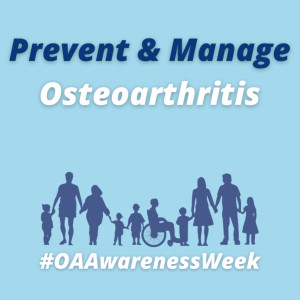
According to the Osteoarthritis Action Alliance An estimated 58.5 million adults in the U.S. are affected by some form of arthritis, which breaks down to about 23.7% of the population. As the number of older Americans continues to grow, and the rates of obesity and overweight increase, the number of people with arthritis-attributable activity limitations will only increase.
Arthritis is a common condition that affects millions of people around the world. There are many different types of arthritis, two of the most common are: osteoarthritis and rheumatoid arthritis. While there is no cure, there are lifestyle changes that can help manage symptoms and improve quality of life. Here are some evidence-based lifestyle changes that can help manage arthritis:
- Exercise regularly: Regular exercise can help reduce pain, improve range of motion, and strengthen muscles around the affected joints. Low-impact exercises such as walking, swimming, and cycling are particularly beneficial for people with arthritis. According to a systematic review and meta-analysis, regular exercise can improve pain, physical function, and quality of life in people with knee osteoarthritis (1).
- Maintain a healthy weight: Being overweight or obese can increase the risk of developing arthritis and exacerbate symptoms in people who already have the condition. Losing weight through diet and exercise can help reduce pain and improve mobility. A study found that losing just 10% of body weight can significantly reduce pain and improve function in people with knee osteoarthritis (2).
- Eat a healthy diet: Eating a balanced diet rich in fruits, vegetables, whole grains, lean protein, and healthy fats can help reduce inflammation and promote overall health. According to a study published in the journal Arthritis & Rheumatism, a Mediterranean-style diet that is rich in fish, olive oil, nuts, and fruits and vegetables can reduce joint pain and improve physical function in people with rheumatoid arthritis (3).
- Get enough sleep: Sleep is important for overall health, and getting enough sleep is particularly important for people with arthritis. Sleep can help reduce pain, improve mood, and promote healing. A study found that poor sleep quality was associated with more severe pain and disability in people with osteoarthritis (4).
- Reduce stress: Stress can exacerbate arthritis symptoms, so it's important to find ways to manage stress. Relaxation techniques such as deep breathing, meditation, and yoga can help reduce stress and promote relaxation. A systematic review found that yoga can improve pain, physical function, and mood in people with osteoarthritis and rheumatoid arthritis (5).
There is no cure for arthritis - however, joint pain and OA symptoms can be managed through treatment, lifestyle changes and education. Make an appointment with your healthcare provider and use this Talking with My Provider Worksheet, provided by the Osteoarthritis Action Alliance, to get you moving on a path to less joint pain.
References:
- Bennell KL, Hinman RS, Metcalf BR, Buchbinder R, McConnell J, McColl G, Green S, Crossley KM. Efficacy of physiotherapy management of knee joint osteoarthritis: a randomised, double blind, placebo controlled trial. Annals of the rheumatic diseases. 2005 Mar 1;64(3):366-73.
- Messier SP, Mihalko SL, Legault C, Miller GD, Nicklas BJ, Devita P, Beavers DP, Hunter DJ, Lyles MF, Eckstein F, Williamson JD. Effects of intensive diet and exercise on knee joint loads, inflammation, and clinical outcomes among overweight and obese adults with knee osteoarthritis: the IDEA randomized clinical trial. Jama. 2013 Sep 25;310(12):1263-73.
- Sköldstam L, Hagfors L, Johansson G. An experimental study of a Mediterranean diet intervention for patients with rheumatoid arthritis. Annals of the rheumatic diseases. 2003 Sep 1;62(3):208-14.
- Allen KD, Choong PF, Davis AM, Dowsey MM, Dziedzic KS, Emery C, Hunter DJ, Losina E, Page AE, Roos EM, Skou ST. Osteoarthritis: Models for appropriate care across the disease continuum. Best Practice & Research Clinical Rheumatology. 2020 Apr 1;34








0 Comments